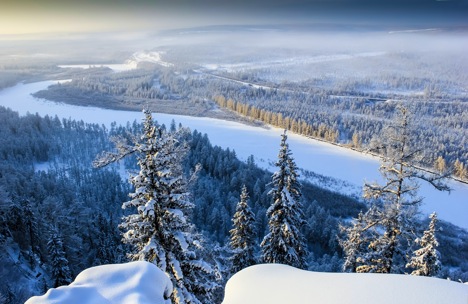
Far East in Winter. Source: Lori/Legion Media
When you live in a place where winter can last six months, there is a feeling of melancholy that grips the mind when the first snow of the season falls on autumn leaves. The start of winter is a time to put away the bicycle and the regular shoes, and if you’re incapable of driving on ice (as I was), parking the car in a garage for a few months.
It’s easier to come to terms with half a year of slippery and icy sidewalks and brutal cold when the freshly fallen snow settles in. A white blanket engulfs the forests and the landscapes of the Russian Far East, one of the most sparsely populated regions in the world. The haunting beauty of snow on evergreen and bare-branched deciduous trees is enhanced with the reflections of the first rays of the sun at dawn.
As beautiful as winter is, the season demonstrates the sheer power of the elements of nature. Powerful snowstorms with winds that can blow children and pets away are common, but I once actually saw an empty minibus get dislodged from the street and blown away until it banged into a garage wall. Thankfully I was indoors when nature played with a heavy manmade object and won.
I figured out that nature has a mind of its own when a specially modified digital camera I purchased for the extreme winter survived for a long two hours in the city of Khabarovsk, where temperatures dropped to minus 29 degrees Celsius.
It’s simply amazing how life goes on as normal in the region, despite blizzards that are so common an occurrence. The central heating never stopped, the water supply (warm and cold) lasted 24/7 as did the electricity. People also managed to get to work on time in the most severe conditions.
Nature did manage to win a few battles against stubborn human beings and interrupt life. The airport in Yuzhno-Sakhalinsk was closed when the volume of snow was just too much to clear. The immigration department was so used to expiring visas on account of passengers being stranded because of inclement weather that it had a special provision for ‘snowstorm visa extensions.’ Blizzards would also affect ferry traffic from the Russian mainland to Sakhalin.
Once the ice floes come south and hardened the top layers of the Sea of Okhotsk, the ice fishing season is officially open. There are articles every year that fishermen get stranded on the sea as loose ice breaks off from the shoreline. I remember the Emergencies Ministry once had to rescue more than 600 fishermen who were quietly and agonisingly moving towards Japan on a giant piece of ice that broke away.
Mother Nature also decides when people need to take a day or two off. On a Sunday evening, when I went to a friend’s house for dinner, I never knew that I would spend the next three days with him and 6 others! The snow came down so heavily and piled up over the ground floor door, which was blocked by ice. There was just no way that we could leave the building and ended up staying in his flat until it stopped snowing and the authorities were able to clear off the ice from the building’s door. There were stories about people moving through snow tunnels during those days.
For some, the best part of the winter is the New Year celebration and the subsequent 10-day holiday that accompanies the festivities. This is when everything from academic institutions to banks and private and government offices are closed. It’s just the hospitals and emergency services that function. When Dmitry Medvedev was president, he spoke of reducing this New Year holiday, obviously understanding the toll it takes on the economy and industrial productivity. Nothing came ever came of his idea and this year we will have a grand total of 11 days.
Some party so hard to welcome the New Year that they need the extended days off to recover. I enjoy the period after the break, when I am usually full of energy and the rest of the country is still in recovery mode. There is almost a hibernation mode that carries on in the Russian Far East right through till March, when the word ‘spring’ can be heard, despite there not being a real sign of the season. What some call spring condtions in the region can easily be classified as severe winter weather in many parts of the world.
Four such winters were enough to make not love snow anymore, but separated from that time by seven years now, I’d gladly trade a sandy and tropical beach for another go at the real king of winters. One can only truly appreciate the magnificence and severity of the season, by spending a few weeks in the Russian Far East between December and March.
All rights reserved by Rossiyskaya Gazeta.
Subscribe
to our newsletter!
Get the week's best stories straight to your inbox